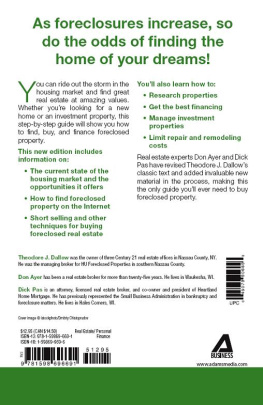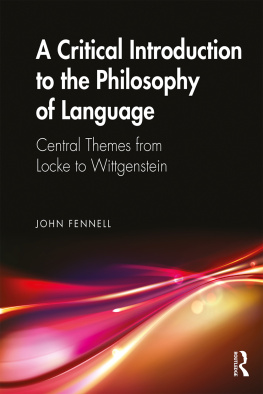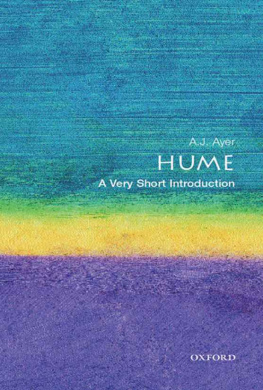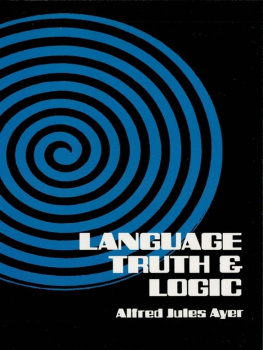PENGUIN BOOKS
Language, Truth and Logic
Sir Alfred Ayer was born in 1910 and educated as a Kings Scholar at Eton and as a classical scholar at Christ Church, Oxford. After spending a short period at the University of Vienna, he became Lecturer in Philosophy at Christ Church in 1933, and Research Student in 1935. In 1940 he joined the Welsh Guards, but was employed for most of the War in Military Intelligence. He returned to Oxford in 1945 as Fellow and Dean of Wadham College. From 1946 to 1959 he was Grote Professor of the Philosophy of Mind and Logic in the University of London. He was Wykeham Professor of Logic in the University of Oxford, and was a Fellow of New College, Oxford, from 1959 until 1978. From 1978 to 1983 he was a Fellow of Wolfson College, Oxford. In addition he was a Fellow of the British Academy, an Honorary Fellow of Wadham College and New College, Oxford, and University College, London, an Honorary Student of Christ Church and an Honorary Member of the American Academy of Arts and Sciences; he held honorary degrees from the universities of East Anglia, London, Durham, Trent in Ontario and Bard College in the USA. His principal publications are The Foundations of Empirical Knowledge; Philosophical Essays; The Problem of Knowledge (Penguin); The Concept of a Person; The Origins of Pragmatism; Metaphysics and Common Sense; Russell and Moore; The Analytical Heritage; The Central Questions of Philosophy (Penguin); Probability and Evidence; Philosophy in the Twentieth Century; Russell; Hume; Freedom and Morality; Ludwig Wittgenstein (Penguin); Voltaire; and Thomas Paine. He also published two volumes of autobiography and contributed articles to philosophical and literary journals. Sir Alfred was knighted in 1970 and was a Chevalier de la Legion dhonneur. Sir Alfred Ayer died in June 1989.
Ben Rogers is the author of A. J. Ayer: A Life and a short book on the great French philosopher, Blaise Pascal. He wrote a doctorate at Oxford on seventeenth-century moral and political philosophy and now lives in London. He writes regularly for the Guardian, Financial Times, Sunday Telegraph, Prospect and other papers.
A. J. AYER
Language, Truth and Logic
Introduction by Ben Rogers

PENGUIN BOOKS
TO R.A.
PENGUIN BOOKS
Published by the Penguin Group
Penguin Books Ltd, 80 Strand, London WC2R 0RL, England
Penguin Putnam Inc., 375 Hudson Street, New York, New York 10014, USA
Penguin Books Australia Ltd, 250 Camberwell Road, Camberwell, Victoria 3124, Australia
Penguin Books Canada Ltd, 10 Alcorn Avenue, Toronto, Ontario, Canada M4V 3B2
Penguin Books India (P) Ltd, 11 Community Centre, Panchsheel Park, New Delhi 110 017, India
Penguin Books (NZ) Ltd, Cnr Rosedale and Airborne Roads, Albany, Auckland, New Zealand
Penguin Books (South Africa) (Pty) Ltd, 24 Sturdee Avenue, Rosebank 2196, South Africa
Penguin Books Ltd, Registered Offices: 80 Strand, London WC2R 0RL, England
www.penguin.com
First published by Victor Gollancz 1936
Published in Penguin Books 1971
Reprinted in Penguin Books 1990
Reprinted with an Introduction in Penguin Books 2001
Copyright 1936, 1946 by A. J. Ayer
Introduction copyright Ben Rogers 2001
All rights reserved
Except in the United States of America, this book is sold subject
to the condition that it shall not, by way of trade or otherwise, be lent,
re-sold, hired out, or otherwise circulated without the publishers
prior consent in any form of binding or cover other than that in
which it is published and without a similar condition including this
condition being imposed on the subsequent purchaser
CONTENTS
p. 13: What is the purpose and method of philosophy? Rejection of the metaphysical thesis that philosophy affords us knowledge of a transcendent reality. 14: Kant also rejected metaphysics in this sense, but whereas he accused metaphysicians of ignoring the limits of the human understanding we accuse them of disobeying the rules which govern the significant use of language. 16: Adoption of verifiability as a criterion for testing the significance of putative statements of fact. 16: Distinction between conclusive and partial verification. No propositions can be conclusively verified. 19: Or conclusively confuted. 20: For a statement of fact to be genuine some possible observations must be relevant to the determination of its truth or falsehood. 21: Examples of the kinds of assertions, familiar to philosophers, which are ruled out by our criterion. 24: Metaphysical sentences defined as sentences which express neither tautologies nor empirical hypotheses. 24: Linguistic confusions the prime sources of metaphysics. 27: Metaphysics and Poetry.
p. 30: Philosophy is not a search for first principles. 30: Barrenness of Descartes procedure. 33: The function of philosophy is wholly critical. But this does not mean that it can give an a priori justification of our scientific or common-sense assumptions. 34: There is no genuine problem of induction, as ordinarily conceived. 36: Philosophising is an activity of analysis. 37: Most of those who are commonly thought to have been great philosophers were philosophers in our sense, rather than metaphysicians. 38: Locke, Berkeley, Hume as analysts. 39: We adopt Berkeleys phenomenalism without his theism. 40: And take a Humean view of causation. 43: Philosophy in our sense is wholly independent of metaphysics. We are not committed to any doctrine of atomism. 44: The philosopher as an analyst is not concerned with the physical properties of things, but only with the way in which we speak about them. 45: Linguistic propositions disguised in factual terminology. 46: Philosophy issues in definitions.
p. 48: Philosophy provides not explicit definitions, such as are given in dictionaries, but definitions in use. Explanation of this distinction. 49: Russells theory of descriptions as an example of philosophical analysis. 52: Definition of an ambiguous symbol. 53: Definition of a logical construction. 54: Material things are logical constructions out of sense-contents. 54: By defining the notion of a material thing in terms of sense-contents we solve the so-called problem of perception. 55: A solution of this problem outlined as a further example of philosophical analysis. 59: Utility of such analyses. 59: Danger of saying that philosophy is concerned with meaning. 61: The propositions of philosophy are not empirical propositions concerning the way in which people actually use words. They are concerned with the logical consequences of linguistic conventions. 63: Rejection of the view that every language has a structure concerning which in the language nothing can be said.
p. 64: As empiricists, we must deny that any general proposition concerning a matter of fact can be known certainly to be valid. 64: How then are we to deal with the propositions of formal logic and mathematics?. 67: Rejection of Mills view that these propositions are inductive generalisations. 71: They are necessarily true because they are analytic. 71: Kants definitions of analytic and synthetic judgements. 73: Emendation of Kants definitions. 74: Analytic propositions are tautological; they say nothing concerning any matter of fact. 74: But they give us new knowledge, inasmuch as they bring to light the implications of our linguistic usages. 76: Logic does not describe the laws of thought. 77: Nor geometry the properties of physical space. 80: Our account of a priori truths undermines Kants transcendental system. 81: How, if they are tautological, can there be in mathematics and logic the possibility of invention and discovery?







